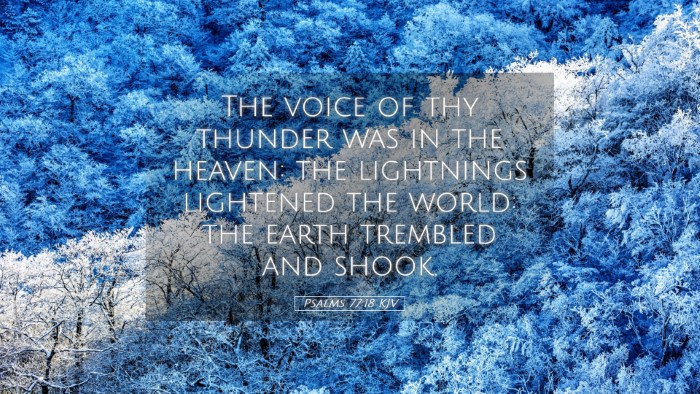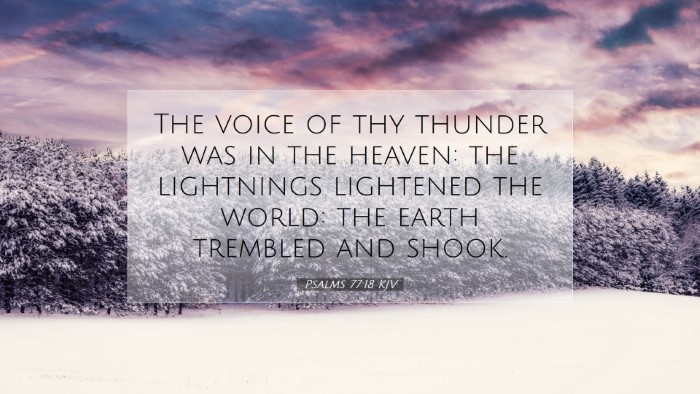Psalms 77:18 Commentary
Bible Verse: "The voice of thy thunder was in the heaven: the lightnings lightened the world: the earth trembled and shook."
Overview
Psalms 77 is a profound expression of distress, faith, and divine intervention. The particular verse 18 highlights the manifestation of God's power through natural phenomena, depicting a cosmic response to God's voice. In the context of the psalm, it serves to reinforce God's might and the response of creation to His commands.
Insights from Public Domain Commentaries
Matthew Henry's Concise Commentary
Henry elucidates the intensity of God's presence as manifested through the elemental forces of nature. He emphasizes that thunder and lightning evoke both fear and reverence, illustrating the sovereignty of God over creation. In this verse, the “voice of thy thunder” symbolizes the tremendous power and authority of God while also reflecting upon the emotional turmoil faced by the psalmist. The earth trembling signifies not only a physical response but is also interpreted as a spiritual awakening, a call to attention for humanity.
Albert Barnes' Notes on the Bible
Barnes provides a detailed exegesis of the terminology used in this verse. He indicates that the “voice” here is a metaphor for God's strong and resounding declarations. He highlights the significance of lightning as a display of God’s majesty and creative power. The phrase “the earth trembled and shook” encapsulates the awe-inspiring presence of God, suggesting that all of creation recognizes His authority. This reaction of nature serves as an encouragement to believers, implying that in times of distress, God's power is still at work, ready to manifest in their lives.
Adam Clarke's Commentary
Clarke emphasizes the contextual setting in which this verse is located, suggesting that it reflects the psalmist’s personal struggles and ultimate reliance on God. He interprets the voices of thunder not just as divine communication but as a reassurement of God's ongoing involvement in the world. Clarke mentions that the lightening illuminating the world could symbolize knowledge and revelation, dispelling the darkness of doubt and fear. The tremors of the earth act as a reminder that God’s presence is not distant; it is active and palpable in the midst of chaos.
Theological Implications
This verse has profound theological implications about God’s omnipotence. The imagery of thunder, lightning, and shaking earth draws parallels to the theophanies seen in the Bible (for instance, the giving of the Law at Sinai) where God's presence was accompanied by awe-inspiring phenomena. The psalmist’s acknowledgment of these phenomena illustrates a key concept in biblical theology: that God is both transcendent (above creation) and immanent (actively involved in the world). This dual nature invites believers to recognize God's active rule over their circumstances while also provoking a response of reverence and awe.
Practical Applications for Believers
- Awareness of God’s Presence: Just as the psalmist reflects on the natural manifestations of God, believers can be encouraged to see God’s presence in their own lives through both gentle and powerful experiences.
- Response to Divine Authority: Understanding that God’s voice commands nature itself should instill a sense of respect and submission in the hearts of believers, motivating them to respond to His call.
- Encouragement in Times of Distress: Reminding oneself of God’s power in creation can serve as a source of strength in personal trials, reinforcing the belief that He is sovereign even when circumstances appear chaotic.
Conclusion
Psalms 77:18 serves as a powerful reminder of God’s majestic and authoritative voice, with nature's response illustrating His tremendous power. For pastors, students, theologians, and scholars, this verse encapsulates essential themes of God's sovereignty and the need for humanity to remain attuned to His divine communication. The insights from Matthew Henry, Albert Barnes, and Adam Clarke collectively offer a rich tapestry of understanding that underscores this verse's significance within the broader context of Scripture.


